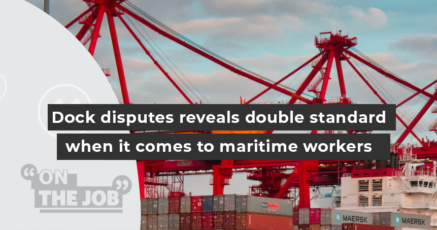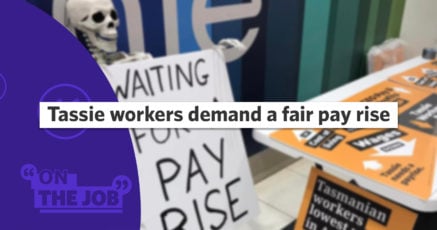Sometimes, work can be dangerous to your health.
A new survey conducted by Australian Unions reveals that it’s not just the physical wellbeing of Australian workers that is at risk at work.
The survey reveals that 17 per cent of Australians have endured mental health injuries as a result of their job, with 10 per cent revealing that they suffer regular bullying at work.
For younger workers and those working on the frontlines of the pandemic response, the risk is significantly magnified. 30 per cent of workers aged under 25 years old said they have suffered a mental health problem due to work, and more than 40 per cent of health and education workers reported regular exposure to stress.
The data from the survey clearly shows that work is putting the health of many Australian workers at risk.
Liam O’Brien is Assistant Secretary of the ACTU. He told On the Job that the survey confirms that Australian workplaces need to lift their game when it comes to looking after both the physical and mental wellbeing of their workforce.

“This research confirms that year on year we’re seeing a massive increase in mental health injuries and illness arising from work,” said O’Brien.
“In the last 12 months, we’ve seen nearly one in five workers suffer from mental ill-health caused by their work, highlighting not just the impact the pandemic is having on a whole range of workers, in particular frontline workers, where that number jumps to one in three.
“It shows that we need to take serious action in workplaces to prevent workers from being exposed to these sorts of stresses.”
As the COVID-19 pandemic continues to ravage Australia, those in precarious and insecure jobs have found themselves under increasing pressure.
With 30 per cent of the Australian workforce in jobs without permanency and entitlements like holiday pay, superannuation and sick pay, another epidemic is growing in the community – an epidemic of anxiety and stress about work.
“Insecure work is a health and safety hazard and needs to be addressed that way,” said O’Brien.
“These workers are more likely to be injured at work, are less likely to report incidents at work and are more likely exposed to hazardous incidents on the job – both physical and psychological hazards.”
The ACTU Assistant Secretary believes workers who find themselves in this situation can empower themselves immediately – by joining their union.
“Organising around health and safety is the most important thing workers can do,” he explained.
“We do have a reasonable set of work health and safety laws that require employers to identify risks in the workplace, to assess them and to apply controls to address them.
“That means in work, health and safety contexts, we should be using those rights. And unions are well placed to advance those issues.”
Working excessive hours and unpaid overtime has become a design feature of far too many Australian workplaces. As employers demand more from their staff, the price being paid by Australian workers is a growing threat to their health and well being.
“This survey showed that we’ve got significant numbers of workers working in excess of 45 to 55 hours a week. The World Health Organization released a report just recently that showed that working [excessive] hours are some of the most significant contributors to premature death and disease, such as heart disease and stroke,” O’Brien told On the Job.
“These are issues that are really magnified when workers are working excessive hours.”
Whilst there has been a lot of work by unions to ensure that workers physical wellbeing is addressed by businesses, the survey reveals that employers are slower at coming to terms with their responsibility to look after the mental health of their workers.
24 per cent of survey respondents disagreed with the proposition that their boss put as much emphasis on workplace mental health issues as they did in ensuring that workplaces were physically safe.
Liam O’Brien said that unions have made serious inroads in this area, but there is a long way to go.
“Over the last few years, the union movement has done a lot to expose the scourge that is mental health in workplaces through our Work Shouldn’t Hurt campaign.
“We’ll hopefully see by the end of the year regulations introduced into our work health and safety laws that specifically requires employers to identify mental health hazards at work and to control them.
“These are the really important achievements that the union movement has made.
“We now need to get on the job of enforcing them.”













SHARE:
Our mental health matters: how can we protect it at work?